The Jihad of Jesus (Part 4): A Strong-But-Gentle Struggle for Love and Justice
Dave Andrews | Monday, 4 May 2015
This series of articles is based on Dave's upcoming book release, The Jihad of Jesus, which is being published by Wipf & Stock. Read Part 1, Part 2, and Part 3 of this series.
On one balmy Sabbath, at the very beginning of his ministry, Jesus visited the synagogue in his home town of Nazareth, and when he was asked to read a passage from Holy Scripture, he turned to a part, written by the prophet Isaiah, where it says:
The Spirit of God has got hold of me,
And is urging me to take on a special task;
To share good news with the poor,
To free the prisoners,
To help the disabled and the disadvantaged,
And to smash the shackles of the oppressed
(Luke 4:18–19)
In so doing, Jesus announced, in front of everyone he knew at the time, that he wanted to make this radical struggle, for God’s love and justice, his manifesto, his mission in life.
Jesus grew up with a passionate concern for the welfare of his people, particularly those that no one else was particularly concerned for. He was passionately concerned about the plight of the poor, the victims of the imperial system. He was passionately concerned about the predicament of the prisoners, the disabled and disadvantaged, excluded from all meaningful participation in society by bars of steel and stigma. He was passionately concerned about the condition of the lepers, not only because of the pain of their ulcers, but also because of the pain of their untouchability. And he was passionately concerned about the situation of ordinary people whose hope had all but been destroyed by their soul-destroying circumstances, and who consequently felt consigned forever to long days, and even longer nights, of utter despair.
For Jesus, a passionate concern for people meant nothing less than a passionate commitment to people. He became forgetful of himself, living instead in constant remembrance of those around him who were themselves forgotten. He desperately wanted them to feel fully alive again, to revel in the joy of being loved, and being able to love, once more. He worked tirelessly to set them free from all that might debilitate them, breaking the bonds of exclusivity, poverty, misery, and guilt. He welcomed the outcast, helped the weak, healed the sick, and forgave the sinner, giving them all another chance at a new beginning. He didn’t write anyone off himself, and he encouraged everyone that he met not to write one another off either. He challenged everyone to tear up their prejudices, trash their stereotypes, and just get their act together — the ‘in’ crowd with the outcast; the strong with the weak; the rich with the poor; the saint with the sinner — to support one another in their common quest for their own humanity.
Jesus was painfully aware of the captivity of the political economy in which he lived. He recognized that this captivity was perpetuated by preoccupation with power, position, and property, at the expense of people’s lives. “What the world esteems,” Jesus said, “is disgusting to God!” (Luke 16:15). His critique was universal, but Jesus actually chose to confront this captivity at a national level, rather than an international level. Jesus was concerned more with the mechanisms of control perpetuated by his own people, than with the mechanisms of control perpetuated by others, for unless these domestic mechanisms of control were dealt with, the foreign yoke might be thrown off, but the captivity would continue. So Jesus confronted the people in his own country — the people of his own culture, tradition and religion — with their responsibility for their own captivity, and for their own liberation. “Don’t judge others,” Jesus said. “Judge yourself” (see Matt. 7:1–3). “How sad it is,” he said to them, that “you neglect to do justice!” (see Luke 11:42). “What will it profit them if they gain the whole world but forfeit their life?” (Matt. 16:26).
In the first phase of his nonviolent jihad for love and justice Jesus followed on from John the Baptist in denouncing the exploitation of the poor by the rich. John told the armed forces: “Don't extort money and don't accuse people falsely — be content with your pay.” And he told the tax collectors: “Don't collect any more than you are required to”. He said: “The man with two tunics should share with him who has none, and the one who has food should do the same,” (Luke 3:11–14). Jesus confronted Zacchaeus, an infamous tax collector, personally about his extortion. As a result of this encounter, Zacchaeus promised Jesus to give “half of my possessions to the poor”, and “if I have cheated anybody out of anything, I will pay back four times the amount,” (Luke 19:8).
In the second phase of his nonviolent jihad for love and justice Jesus not only consistently denounced the oppression of the powerless by the powerful, he also actively advocated liberation of disempowered groups of people through the empowerment of the Spirit. Jesus attacked the key religious leaders of the day, as ‘lovers of money’ (Luke 16:14–15), who would maintain a façade of sanctity, by saying long prayers in public, but would “devour widows’ houses”. When he saw a widow “put everything — all she had to live on” into the collection box, Jesus condemned the temple for extorting the last coin from the kind of person it was set up to protect (Mark 12:38–44). Jesus broke the monopoly on forgiveness that the temple had developed through the sacrificial system it controlled. He did this by baptising people in the Spirit and giving them the authority to forgive sins. “Receive the Holy Spirit,” and “if you forgive anyone his sins, they are forgiven.” (John 20:22–23).
In the third phase of his nonviolent jihad for love and justice Jesus advocated communities with leadership that would serve the people rather than oppress them. In his countercultural communities, Jesus encouraged people to liberate themselves from captivity to the political economy, by developing compassion for people that transcended the sick, obsessive, compulsive preoccupation with power, position, and property that characterised society. “God is compassionate,” Jesus said. “Be as compassionate as God” (Luke 6:35–36).
All oppressive forms of politics were denounced. Charismatic leadership, based on experience, was expected to be exercised within a decision-making framework that functioned according to group consensus. “We all know the bosses call the shots, and the heavies throw their weight around,” said Jesus. “But that is not the way we are going to operate. Whoever wants to be the leader of a group, should be the servant of the group,” (Matt. 20:25–26).
All exploitative forms of economics were renounced. Generosity was expected to be exercised, and wealth freely shared by the rich with the poor, in an earnest quest for genuine equality. “Be on your guard against all kinds of greed,” Jesus said (Luke 12:15); “Give to everyone who begs from you, and do not refuse anyone who wants to borrow from you,” (Matt. 5:42); “Lend, expecting nothing in return,” (Luke 6:35).
In the fourth phase of his nonviolent jihad for love and justice Jesus created communities that were committed to doing justice to the marginalised and disadvantaged. The dominant value of much of Jewish society at the time of Jesus was purity — but the dominant value of Jesus was inclusivity. While the Jews despised Gentiles, Jesus declared “my house shall be called a house … for all nations” (Mark 11:17). While the Pharisees ostracised sinners, Jesus invited outcasts to his parties (Mark 2:16).
In his countercultural communities, Jesus encouraged people to consider other people to be of enormous importance — not just as producers or consumers, but as people in their own right. The people that were usually considered least important, and consequently pushed to the side, were treated as most important and given a place of respect in these countercultural communities. Jesus said: “When you give a luncheon or dinner, do not invite your friends, your brothers (sisters, or relatives, or your rich neighbors); if you do, they may invite you back and you will be repaid. But when you give a banquet, invite the poor, the crippled, the lame, the blind, and you will be blessed. Although they cannot repay you, you will be repaid at the resurrection of the righteous,” (Luke 14:12–14).
The counter-cultural communities Jesus developed never smashed the political economy to which their society was captive. They never completely reconstructed the political economy in terms of the total liberation that they prayed for. However, they did break some of the mechanisms of control to which they were captive. They managed to reconstruct such a substantial degree of liberated — and liberating — alternative political and economic reality, that their experience has served as an example of true love and true justice ever since. According to eyewitnesses, they all met together, breaking bread in their homes and eating together with glad and jubilant hearts. They had everything in common, selling their possessions and giving support to anyone who asked for help. There wasn’t a single person with an unmet need among them, and all the people spoke well of them (see Acts 2:44–47; 4:32–35).
In the fifth phase of his nonviolent jihad for love and justice Jesus demonstrated active, radical, sacrificial nonviolence that would free people from the cycles of violence and counter violence. He said: “I am the good shepherd. The good shepherd lays down his life for the sheep. The hired hand is not the shepherd who owns the sheep. So when he sees the wolf coming, he abandons the sheep and runs away. Then the wolf attacks the flock and scatters it. The man runs away because he is a hired hand and cares nothing for the sheep. I am the good shepherd … and I lay down my life for the sheep. … All who ever came before me were thieves and robbers. I am the gate; whoever enters through me will be saved. He will come in and go out, and find pasture. The thief comes only to steal and destroy; I have come that they may have life, and have it to the full (John 10:11–14, 15, 8–10). Jesus turned to his friends and said: ‘Greater love has no one than this, that he lay down his life for his friends,” (John 15:13).
Under his guidance the Jesus movement became an active, radical, sacrificial peace movement.[i] And for three centuries, Christianity was more or less a pacifist movement. The Apostles taught Christians the pacifist principle: “Love does no harm to its neighbour” (Rom. 13:10). Paul said to: “Bless those who persecute you; bless and do not curse. Do not repay anyone evil for evil. Be careful to do what is right in the eyes of everybody. If it is possible, as far as it depends on you, live at peace with everyone. Do not take revenge. On the contrary: ‘If your enem(ies).are hungry, feed (them); if (they) are thirsty, give (them) something to drink.’ Do not be overcome by evil, but overcome evil with good,” (Rom. 12:14–21).
Jesus is the Supreme Example of Jihad as a ‘Whole-Hearted Strong-But-Gentle Struggle’.
The choice Christians and Muslims need to make is: will we continue to commit to a ‘clash of civilizations’ — or join Jesus and the Nonviolent Jihad for love and justice.
[i] Glen Stassen & David Gushee, Kingdom Ethics (Downers Grove: IVP, 2003), 152.
Dave Andrews and his wife Ange have lived and worked in intentional communities with marginalised groups of people in Australia, Afghanistan and India for forty years. Dave is a founder of the Waiters Union; an educator for TEAR Australia; a teacher at Christian Heritage College; an elder emeritus for Servants To Asia’s Urban Poor; and a member of AMARAH (Australian Muslim Advocates for the Rights of All Humanity).





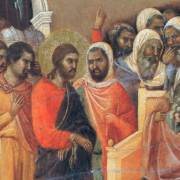

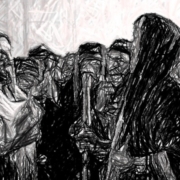
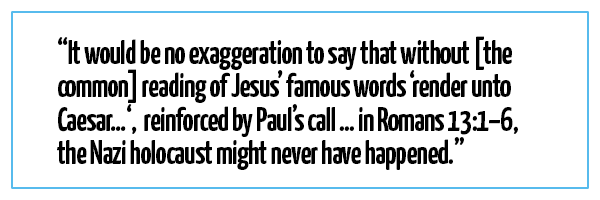 There is no time to exegete either of these two passages in detail here.
There is no time to exegete either of these two passages in detail here.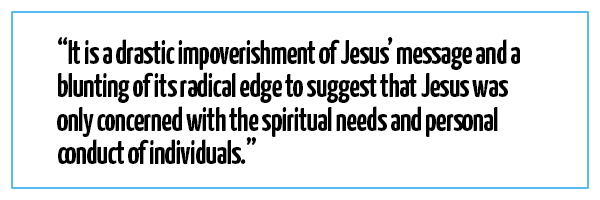 To sum up thus far: Once we cast off the modern blinkers we bring to the gospel story, it becomes clear that Jesus’ message of the dawning kingdom of God had significant political implications. His announcement that God’s long awaited reign was now asserting itself in the world, and his consequent summons for people to rally to the flag, had, as Wright observes “far more in common with the founding of a revolutionary party than with what we now think of as either ‘evangelism’ or ‘ethical teaching’”.
To sum up thus far: Once we cast off the modern blinkers we bring to the gospel story, it becomes clear that Jesus’ message of the dawning kingdom of God had significant political implications. His announcement that God’s long awaited reign was now asserting itself in the world, and his consequent summons for people to rally to the flag, had, as Wright observes “far more in common with the founding of a revolutionary party than with what we now think of as either ‘evangelism’ or ‘ethical teaching’”.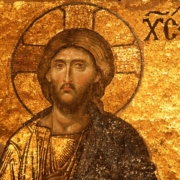
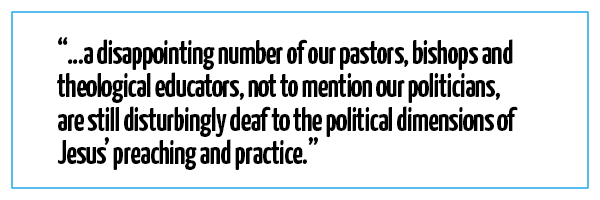 Thankfully the church no longer burns witches or deploys its own armies. But most confessing Christians, and a disappointing number of our pastors, bishops and theological educators, not to mention our politicians, are still disturbingly deaf to the political dimensions of Jesus’ preaching and practice, and to its far-reaching implications for shaping an authentically Christian political witness today. But why is this the case? Why do modern readers of the gospels still commonly, if not completely, miss the political ramifications of Jesus’ proclamation? And why is it that today’s Christian voice in the public square is so often bereft of any anchoring in the story of Jesus, whether explicit or implicit, thus allowing alternative sources of authority, such as conservative middle class values and morality, to fill the vacuum? Whence comes this depoliticised Jesus?
Thankfully the church no longer burns witches or deploys its own armies. But most confessing Christians, and a disappointing number of our pastors, bishops and theological educators, not to mention our politicians, are still disturbingly deaf to the political dimensions of Jesus’ preaching and practice, and to its far-reaching implications for shaping an authentically Christian political witness today. But why is this the case? Why do modern readers of the gospels still commonly, if not completely, miss the political ramifications of Jesus’ proclamation? And why is it that today’s Christian voice in the public square is so often bereft of any anchoring in the story of Jesus, whether explicit or implicit, thus allowing alternative sources of authority, such as conservative middle class values and morality, to fill the vacuum? Whence comes this depoliticised Jesus?